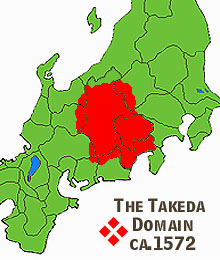| |
|
| |
 |
Fielder of the
strongest cavalry brigade ever seen, he expanded his territory and
became known as the 'Tiger of Kai'
SAMURAI ARCHIVES |
| |
| |
|
The Takeda had been shugo
(provincial governors) of Kai since the days of the Kamakura
Shogunate. Shingen's father, Nobutora, had lain the foundations
for the family's advance to the role of major Sengoku daimyo, but
he had been expelled to Suruga, leaving Shingen with control of
the family from 1541, at the age of 21. Shingen immediately
launched an attack on Shinano, gaining control of almost all of it
within just three years. When the defeated Murakami of Shinano,
sent requests to the Uesugi of Echigo for assistance, Shingen too
sent in his troops back into Shinano, and there followed the first
stage of the notable Battle of Kawanakajima; there were to be five
more - and that is counting only the major conflicts. These
Battles of Kawanakajima remain famous, and plays, films and novels
have frequently retold the story. Subsequent encounters expanded
both men's holdings in the Kanto but particularly added to
Shingen's fame. Shingen had meanwhile been repeatedly forming
alliances and breaking them in an unending conflict with the
Imagawa and Hojo. But he now allied definitively with the latter
with the intention of marching on Kyoto. This required the
court's permission, and if they gave it, it was tantamount to
their accepting the right to control the realm. The Tokugawa had
the same aim. Shingen therefore made for the Tokugawa base at
Hamamatsu, and, at the battle of Mikata-ga-Hara destroyed the
combined forces of Tokugawa Ieyasu and Nobunaga. He then moved to
occupy Mikawa, but on a rapid return trip to Kai, he fell ill and
died. He was 53 years old. Shingen's battle philosophy was taken
from the great Chinese strategist Sun Tzu, whose famous 'Art of
War' advocated victory without fighting, through clever planning
and stratagems. Shingen also strove for victory with minimal
losses. He also undertook waterworks, other public projects, and
was admired as a statesman. |
| |
| |
|
Sun Tzu |
|
"Know your
enemy and know yourself and you can fight a hundred battles
without disaster. When the enemy is at ease, be able to weary
him; when well fed, to starve him; when at rest, to make him
move." |
| |
|
 HOME
PAGE
HOME
PAGE |
 MAIN PAGE
MAIN PAGE |
 ETHICS IN JUJITSU
ETHICS IN JUJITSU |
|
|
If you are not
finding what you are looking for, or you've found an interesting
subject that you would like to research further, just type it into the
search box to the left and you will be redirected to the Google™
search pages for that subject.
Thanks for visiting our site!!! |
|
 |
|

